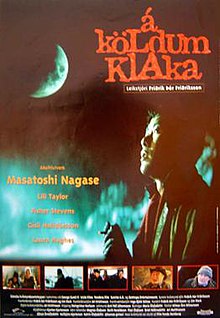Cold Fever
| Cold Fever | |
|---|---|
 Icelandic theatrical poster. | |
| Directed by | Friðrik Þór Friðriksson |
| Written by | Friðrik Þór Friðriksson Jim Stark |
| Produced by | Jim Stark |
| Starring | Masatoshi Nagase Lili Taylor Fisher Stevens |
| Cinematography | Ari Kristinsson |
| Edited by | Steingrímur Karlsson |
| Music by | Hilmar Örn Hilmarsson |
| Distributed by | Artistic License Films Iceland Film Corporation |
Release date |
|
Running time | 85 minutes |
| Country | Iceland |
| Language | English / Icelandic / Japanese |
| Budget | ISK 130,000,000 |
Cold Fever (Icelandic: Á köldum klaka) is a 1995 Icelandic film directed by Friðrik Þór Friðriksson. It is a road movie set in Iceland and was the first of Friðrik's films to be made in the English language. The movie depicts the travels of a Japanese man across Iceland. It was jokingly promoted as the best Icelandic-Japanese road movie of 1995.[1]
Synopsis
[edit]Hirata is a successful Japanese businessman whose plan for a two-week winter holiday in Hawaii to play golf changes when his elderly grandfather reminds him that he should go to Iceland.
Hirata's parents died there seven years ago, and the seven-year anniversary of a death is a significant event in Japanese culture. Hirata must perform a ceremony in the river where they died after drowning in an avalanche – the drowned must be fed by the surviving family members if they are to find peace.
Hirata arrives in Reykjavík, Iceland. His final destination is a remote river on the far side of the island. He encounters one mishap and misadventure after another. He first accidentally gets on a wrong bus filled with German tourists traveling to see the hot springs. He also confronts a language barrier; Hirata cannot speak any Icelandic, and knows very little English. After his first day's misadventures, Hirata decides to purchase an ancient, bright red Citroën DS to make the journey. During the long drive, Hirata meets several strange people along the way. These include the mystical woman who sells him the car, which only plays one radio station. Next, Hirata meets a local woman who collects photographs of funerals. The following day, Hirata meets Jack and Jill, two American hitchhikers, who turn out to be armed and dangerous fugitives who proceed to steal his car. Nearing his destination on foot, Hirata arrives in a small village where he meets an old man named Siggi, the owner of a local lodge who teaches Hirata how to drink the most potent alcoholic beverage in Iceland.
After explaining his determination to travel to where his parents died, Hirata is aided by Siggi who borrows a pair of Icelandic horses from a local farmer, and the two of them travel on horseback to Hirata's destination. After riding across an ice cap glacier, over a ridge and into the valley where Hirata's parents died, he dismounts and tells Siggi that he must go on alone to complete his journey. After traversing a rickety bridge to the river, Hirata arrives at the river bank where he performs his cleansing ceremony at last. He then rejoins Siggi waiting for him and they both ride on their horses down a gully where they make it to a beach and the final shot shows them riding down the coast towards a nearby coastal village which hopefully will have a ferry to take Hirata back to Reykjavík and presumably back to Japan.
Credits
[edit]Cast
[edit]- Masatoshi Nagase: Hirata
- Lili Taylor: Jill
- Fisher Stevens: Jack
- Gísli Halldórsson: Siggi
- Seijun Suzuki: Grandfather
- Laura Huges: Laura
- Jóhannes B. Guðmundsson: Old Man
- Bríet Héðinsdóttir: Old Woman
- Guðmundur Karl Sigurdórsson: Guest at Thorrablot (uncredited)
- Magnús Ólafsson
- Rúrik Haraldsson
- Flosi Ólafsson: Hotel owner
- Ari Matthíasson
- Álfrún Örnólfsdóttir
- Hallbjörn Hjartarson: Cowboy of the North
- Katrín Ólafsdóttir
Crew
[edit]- Director: Friðrik Þór Friðriksson
- Screenplay: Jim Stark and Friðrik Þór Friðriksson
- Producer: Jim Stark
- Co-producer: George Gund III
- Executive producer: Reinhard Brundig, Peter Aalbæk Jensen, and Christa Saredi
- Line producer: Ari Kristinsson
- Director of Photography: Ari Kristinsson
- Production Designer: Árni Páll Jóhannsson
- Editor: Steingrímur Karlsson
- Film edition: Steingrímur Karlsson
- Sound Design: Kjartan Kjartansson
- Sound edition: Ingvar Lundberg
- Music: Hilmar Örn Hilmarsson
- Featuring “Killer Boogie” by Þeyr
- Costume design: María Ólafsdóttir
- Production manager: Inga Björk Sólnes
- Gaffer: Andreas Burkhard
- Generator operator: Eggert Einarsson
- Still photography: Mark Higashino
- Script supervisor: Inga Lísa Middleton
- Colour grader: Petra Schütt
- Production: Icelandic Film Corporation, Iciclefilm, Pandora Film, Sunrise Inc., Zentropa Entertainments, George Gund III
- Support: Film Fond of Hamburg
Critical response
[edit]On review aggregator website Rotten Tomatoes, the film holds an approval rating of 95% based on 20 reviews, and an average rating of 7.5/10.[2]
See also
[edit]The Goddess of 1967, another movie in which a successful Japanese man travels foreign land in a newly purchased bright (this time pink) 1967 Citroen DS and meets strange characters, though this time in Australia.
References
[edit]This article needs additional citations for verification. (November 2009) |
- ^ "10 great Icelandic films." Sarah Lutton, BFI 23 January 2018
- ^ Cold Fever, retrieved 2018-06-03
External links
[edit]- Cold Fever at the Icelandic Film Corporation
- Cold Fever at IMDb
- Cold Fever at Rotten Tomatoes
- Cold Fever at AllMovie
- Cold Fever at the Shopicelandic.com
- 1996 films
- 1995 films
- 1990s adventure films
- 1995 comedy-drama films
- English-language Icelandic films
- 1990s Icelandic-language films
- Icelandic independent films
- 1990s road movies
- Films directed by Friðrik Þór Friðriksson
- Films scored by Hilmar Örn Hilmarsson
- Films set in Iceland
- Japan in non-Japanese culture
- 1990s English-language films
- 1995 multilingual films
- Icelandic multilingual films
- English-language comedy-drama films
- English-language adventure films
